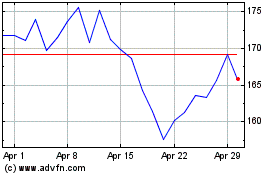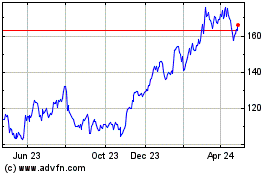Silicon Valley Helped Build Huawei. Washington Could Dismantle It.
December 09 2018 - 7:59AM
Dow Jones News
By Dan Strumpf
American companies have been crucial in helping Huawei
Technologies Co. become the world's dominant telecommunications
player.
Silicon Valley giants from Intel Corp. to Broadcom Inc. and
Qualcomm Inc. are top suppliers of Huawei, which buys their
components to make equipment such as base stations and routers and
Huawei mobile phones. By one estimate, Huawei will buy up to $10
billion of components from American companies this year--roughly
the value of China's automobile imports from the U.S.
Qualcomm and Intel are also working with Huawei on its
development of next-generation 5G technologies, a field in which
the Chinese company's aim to be a global leader has alarmed some in
Washington.
These interdependencies show how any U.S. actions against Huawei
for alleged sanctions violations, which could go as far as a ban on
it buying from American suppliers, could devastate Huawei's
operations, and curtail business for U.S. tech companies. Huawei's
chief financial officer, Meng Wanzhou, was arrested in Vancouver on
Dec. 1 at the behest of U.S. authorities investigating fraud
related to sales to Iran.
The arrest raised the stakes for Huawei and its overseas
partners and has cast a pall over trade negotiations between the
world's two largest economies. Shares of tech companies in China
and the U.S. have already slumped this year as fears rise that
trade tensions will disrupt business across the Pacific.
In the wake of Ms. Meng's arrest, Huawei has sought to reassure
its suppliers. In a memo dated Dec. 6 and viewed by The Wall Street
Journal, Huawei said it knew of no wrongdoing by Ms. Meng and it is
"unreasonable of the U.S. government to use these sorts of
approaches to exert pressure on a business entity." Huawei's
partnerships with global suppliers wouldn't change, it said.
If the U.S. concludes Huawei evaded U.S. sanctions, further
actions could follow. Huawei's chief Chinese rival, ZTE Corp., was
originally slapped with a fine after it admitted to evading U.S.
sanctions, but subsequent violations of its settlement agreement
led the U.S. government to temporarily ban American companies from
selling it products--sending ZTE to the brink of collapse.
Authorities imposed a similar ban on Chinese chip maker Fujian
Jinhua Integrated Circuit Co. in October, citing national-security
and economic concerns.
U.S. companies stand to lose too, with China being the
second-biggest buyer of its $58.4 bilSHYlion of semiconducSHYtor
exports last year, acSHYcordSHYing to the U.S. InSHYternational
Trade AdSHYminSHYisSHYtraSHYtion. Huawei alone is on track to buy
about $10 billion of components from U.S. companies this year, up
from $8 billion in 2017, estimates Handel Jones, chief executive of
technology consulting firm International Business Strategies Inc.,
which tracks China's high-tech sector.
"It's a pretty extensive list of companies that would be heavily
impacted" if Huawei were to lose access to its American suppliers,
Mr. Jones said. "It would be a very serious situation."
Huawei is by far the biggest-spending Chinese tech company when
it comes to research and development. It has an in-house
chip-design unit that is the seventh largest in the world. It is
working on high-end chips for artificial intelligence, and its
chips are increasingly displacing foreign suppliers in its
smartphones: Only 7% of the semiconductors inside Huawei's
top-of-the-line P20 Pro are from American suppliers, according to
ABI Research, compared with 60% in ZTE's high-end Axon M
device.
Yet Huawei still relies on imports from U.S. chip companies such
as Broadcom, Xilinx Inc. and Analog Devices Inc. for components
used in its telecom equipment, according to a breakdown of its
suppliers by investment bank Jefferies. Huawei buys equipment from
data-storage equipment maker Seagate Technology PLC for use in its
enterprise business, and uses memory chips made by Micron
Technology Inc. in its smartphones, the bank said.
A Xilinx spokeswoman said the company "is aware of the situation
and is monitoring it closely." The other suppliers either declined
to comment or didn't respond to requests for comment.
Intel and Qualcomm, which draw huge revenue from China, are seen
by Huawei as more than suppliers. In Huawei's annual report, Intel
is described as a "strategic partner," and the companies work
together in a range of areas, including next-generation 5G
technology.
On Dec. 5, Huawei announced it had completed a test of key 5G
technology using Intel processors and a Huawei base station. In
September, Huawei credited help from Intel as it made its first
phone call on a type of 5G network.
Intel declined to comment.
Qualcomm has also been a collaborator in 5G. Earlier this year,
the San Diego chip maker said it supplied prototype equipment used
in a 5G test by Huawei. In 2015, Qualcomm, Huawei and China's
largest chip maker, Semiconductor Manufacturing International
Corp., launched a joint venture in Shanghai to work on
next-generation chip technology.
Fears about Huawei's dominance in 5G technology were behind the
U.S.'s decision to scuttle the takeover of Qualcomm by Broadcom
earlier this year. Both companies declined to comment.
Yifan Wang, Jay Greene and Tripp Mickle contributed to this
article.
Write to Dan Strumpf at daniel.strumpf@wsj.com
(END) Dow Jones Newswires
December 09, 2018 07:44 ET (12:44 GMT)
Copyright (c) 2018 Dow Jones & Company, Inc.
QUALCOMM (NASDAQ:QCOM)
Historical Stock Chart
From Mar 2024 to Apr 2024

QUALCOMM (NASDAQ:QCOM)
Historical Stock Chart
From Apr 2023 to Apr 2024
